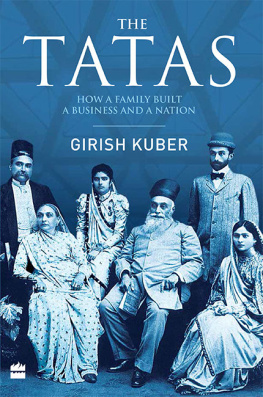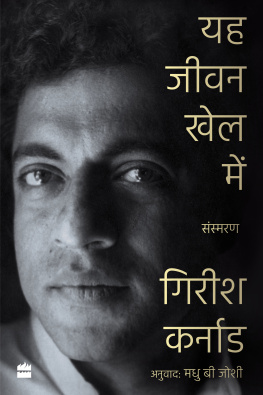Girish Kuber - Renaissance State: The Unwritten Story of the Making of Maharashtra
Here you can read online Girish Kuber - Renaissance State: The Unwritten Story of the Making of Maharashtra full text of the book (entire story) in english for free. Download pdf and epub, get meaning, cover and reviews about this ebook. year: 2021, publisher: HarperCollins Publishers India, genre: Detective and thriller. Description of the work, (preface) as well as reviews are available. Best literature library LitArk.com created for fans of good reading and offers a wide selection of genres:
Romance novel
Science fiction
Adventure
Detective
Science
History
Home and family
Prose
Art
Politics
Computer
Non-fiction
Religion
Business
Children
Humor
Choose a favorite category and find really read worthwhile books. Enjoy immersion in the world of imagination, feel the emotions of the characters or learn something new for yourself, make an fascinating discovery.

- Book:Renaissance State: The Unwritten Story of the Making of Maharashtra
- Author:
- Publisher:HarperCollins Publishers India
- Genre:
- Year:2021
- Rating:4 / 5
- Favourites:Add to favourites
- Your mark:
- 80
- 1
- 2
- 3
- 4
- 5
Renaissance State: The Unwritten Story of the Making of Maharashtra: summary, description and annotation
We offer to read an annotation, description, summary or preface (depends on what the author of the book "Renaissance State: The Unwritten Story of the Making of Maharashtra" wrote himself). If you haven't found the necessary information about the book — write in the comments, we will try to find it.
Girish Kuber: author's other books
Who wrote Renaissance State: The Unwritten Story of the Making of Maharashtra? Find out the surname, the name of the author of the book and a list of all author's works by series.
Renaissance State: The Unwritten Story of the Making of Maharashtra — read online for free the complete book (whole text) full work
Below is the text of the book, divided by pages. System saving the place of the last page read, allows you to conveniently read the book "Renaissance State: The Unwritten Story of the Making of Maharashtra" online for free, without having to search again every time where you left off. Put a bookmark, and you can go to the page where you finished reading at any time.
Font size:
Interval:
Bookmark:


(The glory of Maharashtra will grow like the new moon.
It will be worshipped by the world
and will shine only for the well-being of its people.)
The motto from the emblem of Maharashtra, based on one found on the rajmudra or the royal seal used by Chhatrapati Shivaji, the difference being that the name of the monarch is replaced by the name of the state.
To the late Professor Narhar Kurundkar,
Maharashtras pre-eminent scholar, who, like many others from the state, deserved better recognition
Contents

T his book is not an academic study of Maharashtras history. It has not been written from the high perch of a historian, but instead looks at the states history from the lens of a journalist who is obsessed with finding a story the story here being what history tells us about the nature of the Marathi Manoos, without taking a chauvinistic view of the matter. History, then, is the medium here, not the mission, to tell that story.
My understanding of the vast annals of history in the pages that follow rests, as the historian Tony Judt put it in his legendary book Postwar, on the shoulders of other books, a detailed, if not exhaustive, list of which the reader may find at the end. In the absence of published historical material, I have occasionally also referred to online sources that were at hand. Having said that, I hope readers will find the story itself engaging and worth their while.
I am aware that any one book, let alone this one, cannot be comprehensive enough to capture the sheer expanse of Maharashtras history and that of its people. And in this type of book, the real dilemma an author faces is what to exclude. I faced it too and know that there are many more worthy Maharashtrians whose presence here would have made this book even more valuable. Muslim reformist Hamid Dalwai, pioneer of the Indian insurance industry Annasaheb Chirmule, and noted economist Dhananjayrao Gadgil, who gave a nascent nation a formula for the devolution of taxes and also conceptualized the cooperative movement along with Vaikunthbhai Mehta, are some of the notable exclusions. My sincere apologies for this.
Though the writing of this book was an absolute pleasure, it was not easy to spare time for it while being entrusted with the responsibilities of the Marathi daily Loksatta. I thank Mr Viveck Goenka, Chairman and Managing Director of the Indian Express Group, who was kind enough to allow me to juggle both simultaneously. I am also thankful to Mr George Varghese and Ms Vaidehi Thakar, CEO and Publisher of the Express group respectively, and other colleagues for their encouragement.
I owe special thanks to Prasad Havale, my young teammate in Loksatta, for his suggestions and efforts in helping me find the necessary references. Discussions with Prasad, himself a student of Maharashtras political and social history, were always insightful and were of immense help. A former colleague, Ravi Amle, was also instrumental in procuring the required books for me. I thank him too.
Outside of my workplace, I must mention Siddhesh Inamdar, my editor at HarperCollins, for his painstaking efforts and patient handling of the publication process. His keen interest in the subject helped me stay engaged. I will be failing in my duty if I dont thank Amit Malhotra for the brilliant cover artwork, which perfectly encapsulates the theme of the book.
And, most importantly, thanks to my wife Shami, daughter Mrunmayee and her partner Abhishek for discounting me from family duties, without which it would have been impossible to spare time for the book.
Girish Kuber
Mumbai March 2021

T he year was 1991. The V.P. Singh and Chandra Shekhar governments at the Centre had fallen in quick succession. India was grappling with grave political uncertainty. One more general election was on the horizon and, as a political reporter, I was trying to gauge the mood. Travelling from Goa where I was posted at the time I landed in Kankavli, a small, sleepy town in the Konkan region of Maharashtra. Madhu Dandavate, the finance minister in the Singh cabinet, was contesting the election from there. It was the constituency that had sent him to Parliament five times in a row.
Nana as Dandavate was fondly called was a socialist. I caught up with him late one evening at fellow activist Shashi Taishetyes house. Nana was dressed in a white short-sleeved kurta and old-fashioned striped cotton pyjamas. Since I knew him personally, the conversation was candid and freewheeling. Soon it veered towards the overall decay of values in politics the topic old-school socialists always like to lament about. Nana unravelled many details about V.P. Singhs style of functioning. And then came the real shocker.
I was asked to take the lead in dislodging Singh, Nana said in his usual nonchalant tone.
What? I said, caught by surprise, as the implication of what he had said dawned on me.
A large number of MPs from our party approached me after it became clear that Singh was turning into a burden, he added. They offered to push for his removal and propose my name as they believed I was the most acceptable, non-controversial leader they had. Some of them even assured me support from the Congress party.
I was eager to know what had happened next. Knowing that Chandra Shekhar was eventually agreed upon for the post, I wanted to understand why and how Dandavate had fallen out of the race.
Nothing, he said. I simply refused. Thats doublecrossing! How could I betray my leader?
The conversation that followed was a long lecture in political values and the importance of loyalty. I tried to interrupt only once, very meekly, when I asked, But, Nana, how could you turn down an opportunity to be the Prime Minister of India? Havent you done a great injustice to Maharashtra?
No! he said. Maharashtra should be proud of the fact that I didnt deceive my leader.
I realized that he did not see the episode as a wasted opportunity. This was because he was a true-blue Marathi Manoos. In politics, history is replete with examples that show how the Marathi Manoos has been more comfortable serving as an able deputy to another leader than staking claim to ultimate power himself.
Interestingly, only a few months later, another Marathi Manoos, Sharad Pawar, tried to grab the throne but lost out to P.V. Narasimha Rao. Again, it was the same history at play. Barring three distant exceptions Chhatrapati Shivaji, Peshwa Baji Rao and Bal Gangadhar Tilak Marathi Manoos is known to have played second fiddle to another master in power politics. At various times these masters were Mughals, Rajputs, Pathans or north Indians. Rarely did the Marathi Manoos think of turning the tables.

MAHARASHTRA MEANS A GREAT State and it did live up to its name at one point. Dynasties from this region once ruled more than half of what is India today. In prehistoric times, some of these empires spread right up to Madurai and Rameswaram in the south, Raipur and Jabalpur in the east, Udaipur and Chitrakoot in the north and Girnar in the west. Though its geographical spread is not as vast today, the state remains second only to Uttar Pradesh in terms of political significance and strength in the Lok Sabha. It is geographically larger than all of Great Britain. If it were a separate country, it would rank twelfth in the world by population, leaving behind all European nations except Russia.
Next pageFont size:
Interval:
Bookmark:
Similar books «Renaissance State: The Unwritten Story of the Making of Maharashtra»
Look at similar books to Renaissance State: The Unwritten Story of the Making of Maharashtra. We have selected literature similar in name and meaning in the hope of providing readers with more options to find new, interesting, not yet read works.
Discussion, reviews of the book Renaissance State: The Unwritten Story of the Making of Maharashtra and just readers' own opinions. Leave your comments, write what you think about the work, its meaning or the main characters. Specify what exactly you liked and what you didn't like, and why you think so.








